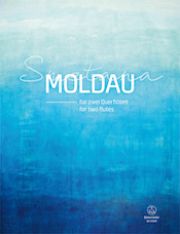Moldau in duet
A beautiful arrangement of the symphonic work, which can be used as short individual pieces or as a coherent concert version.

The present edition is an adaptation of the most beautiful motifs from the Moldova for two flutes. The tone poem is part of the symphonic cycle My fatherland by Bedřich Smetana. In the original, too, the Moldova with two flutes symbolizing the bubbling springs from which the great stream then emerges. At first, the two instruments alternate with the melodic sections until the first voice plays the great cantilena. In the second part, "Wälder - Jagd", the flutes effectively imitate the striking, dotted horn motif, which is played in thirds and sixths. The "Bauernhochzeit" also approaches the original through the dense setting of the semiquavers. The beginning of "Mondschein - Nymphenreigen" is also based on the original movement, although the arranger Jennifer Seubel recommends leaving out one of the many semiquavers for breathing. In the fifth part, "The wide river of the Moldau - Vyšehrad motif", she suggests playing individual passages an octave lower as an alternative.
The thematic action largely takes place in the first part, so that it is a good idea to swap the parts between the movements, especially because the second part, which replaces the accompanying parts of the orchestra, presents a challenge. The author suggests interpreting the parts either as short, self-contained pieces or as a concert version. This beautiful arrangement enriches the duo repertoire and can also be played well with advanced pupils.
Bedřich Smetana: Moldau, arranged for two flutes by Jennifer Seubel, BA 10929, € 13.95, Bärenreiter, Kassel








